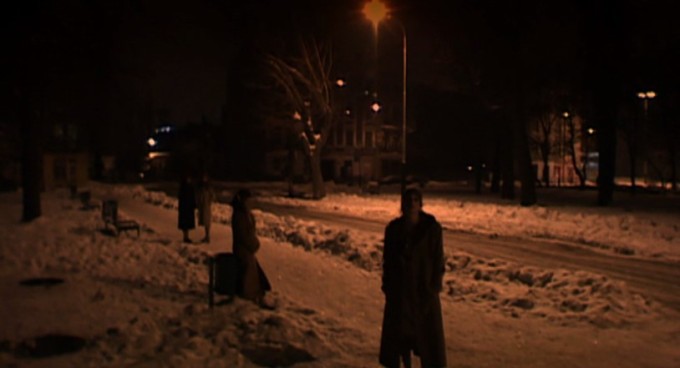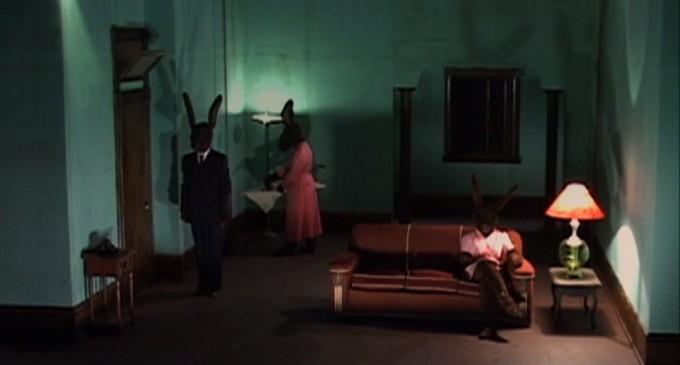Directed by David Lynch, 2006, 180 minutes
Actress Nikki Grace (Laura Dern) wins a comeback role alongside glamorous lead actor Devon Berk (Justin Theroux). She learns that the film ‘On High in Blue Tomorrows’ may be cursed and that previous attempts to shoot it have ended in death. As filming progresses Nikki’s personal life and her performance become entangled.
In the late 1990s David Lynch was becoming increasingly trapped within the constraints his own style. Despite critically acclaimed studio films like ‘Mulholland Drive’ (nominated for an Academy Award in 2002) and more experimental efforts like ‘Lost Highway’ (1997) his imagery was starting to feel over-familiar. Lynch’s work had almost become self-pastiche and it became too easy to sum up his style with the convenient critical shorthand of ‘Lynchian’. He had travelled a long way from the early subversive shocks of ‘Eraserhead’ (1977), his dreamscapes branded and sold like any other commodity. In search of new creative territories Lynch discovered the ‘Inland Empire’ and the feeling that he has returned to his craft with new energy is intensely refreshing and invigorating.
Lynch is entranced by the potential of digital video to create faster, dirtier imagery more in keeping with the sweaty, breathless tone of nightmare. ‘Inland Empire’ represents a summation of all his previous work but delivered in a fresh idiom. Bleary, hand-held digital photography keeps the audience in darkness for much of the film and creates an intense sensation of unease. In the words of Frank Booth (Dennis Hopper) in ‘Blue Velvet’ (1986) “Now it’s dark”, but really dark. As in ‘Mulholland Drive’ where something terrible lurks just behind the diner gloomy passageways found in vacant lots or obscure backstreets offer passage to the ‘Inland Empire’, a shadow space that waits just behind the normal world. Flashes of familiar Lynch motifs: disturbing standard lamps and stained walls lit by pools of red light offer scant relief to eyes that must peer into the murk. This is a bleak, austere film far removed from the colourful beauty of ‘Mulholland Drive’ but there are also some moments of magisterial, haunted beauty. The snow-bound night streets of a small Polish town recall the nightscapes of Bruno Schulz where darkened doorways beckon to magical worlds and winter nights seem to last forever.

The new territories of ‘Inland Empire’ are a broader expanse than the backlots of Hollywood or the suburbs of small-town America explored in Lynch’s earlier work. He acknowledges that the migrants who built America brought their own stories and dreams with them to become part of the haunted psyche of their new world. As the film begins Nikki receives a visitor from this older world in the form of a new neighbour (Grace Zabriskie). Her stilted English and confrontational language grates against Nikki’s civilised conversation as they sit in the actresses’ home amidst décor that apes the classical baroque of European aristocracy. This scene economically introduces ‘Inland Empire’s key theme in the form of an ancient European fable about the entry of evil into the world through a child’s reflection. Nikki’s persona is similarly fractured and reflected through a wilderness of film and television screens as the film proceeds. Reality becomes impossible to define and is invaded by horrors. Similar images of incursion have recurred throughout Lynch’s work; most notably in ‘Mulholland Drive’ but here the monsters are more intimate and disturbing. When Nikki confronts a grotesque amalgam of her own violence and frustration it appears as a distorted reflection from a fun-house mirror, a hideous candy coloured clown.
Lynch is fascinated by the interaction between story and reality. As the various narrative threads of ‘Inland Empire’ merge and overlap he compares the staged emotionality of cinema and television drama with much older narrative traditions. Some tales carry a burden of evil; a theme encapsulated in the haunted script of ‘On High in Blue Tomorrows’. This cursed film-within-a-film is based on folk tale and there is ‘something inside the story’, something dangerous. Lynch is offering much more than a simplistic critique of pop culture: Even the most innocent or banal story can contain hidden traps; the film within ‘Inland Empire’ distorts the fabric of reality itself and the bizarre Rabbit soap opera with its gratingly mistimed and inappropriate laugh-track is full of dreadful expectation. ‘Inland Empire’s disturbingly flat, mannered performances all seem artificial. Long, awkward silences punctuate the dialogue; lines are repeated and rehearsed from one level of reality into another. All this makes it difficult for the viewer to be sure what kind of narrative he or she is watching. At one point we watch what seems to be a ‘real’ death scene only to see the camera pull back to reveal the paraphernalia of a film shoot. Actors and fictional characters are trapped in ceaseless continuum where reality and artifice fold one into another like a Möbius strip. Lynch demonstrates the fragility of the real in a moment of surreal genius as Nikki slips between worlds through a cigarette hole burned in silk. Lynch bends space and time like the Guild Navigators of ‘Dune’ (David Lynch, 1984), a beautiful and poetic motif quite unlike anything else in cinema.

Folk tale and cinema often present female archetypes rather than characters. Lynch’s previous work has the demonic mother figure of ‘Wild at Heart’ (1990), the teenage victims of ‘Twin Peaks’ (1990) and the seductive predators of ‘Lost Highway’ or ‘Mulholland Drive’ but here the more complex character of Nikki combines elements of all these archetypes. Laura Dern, who also produced the film, contributes a courageous performance of incredible range. She appears brittle one moment; her painted face and celebrity manners always on the point of fracture and in another she is harsh, and violent, bereft of make-up, broken and pitiful. Nikki is the quintessence of Lynch’s female characters, but she also transcends them in opposition to the cycle of male oppression found throughout ‘Inland Empire’. These monstrous males include Nikki’s possessive, tyrannical husband (Peter J Lucas), the sexually manipulative Devon, star of ‘Blue Tomorrows’ (Justin Theroux) and the sinister phantom (Krzysztof Majchrzak) who murders and intimidates prostitutes in a Polish village. ‘Inland Empire’s troubled women are epitomised in the figure of the Lost Girl (Karolina Gruszka), who fulfils a similar role to the scarred man in ‘Eraserhead’. She watches the action but lacks agency, trapped inside narratives of oppression and violence. Nikki must break this cycle and set the Lost Girl free, healing fracture and restoring balance. In a witty riposte to past accusations of misogyny Lynch rolls the closing credits over a haka-like celebration of empowered femininity accompanied by the voice of Nina Simone.
It’s impossible to offer definitive ‘solutions’ to David Lynch’s work. Like dreams (or nightmares) his films may have many meanings, or they may have none at all and these thoughts are offered with that in mind. ‘Inland Empire’ is a difficult film to watch with very little cheer in almost three hours of dark digital video. The films sombre tone is closest in mood to ‘Lost Highway’ (1997). There are some lighter moments, but not many: Lynch parodies his branded self with a plug for his own coffee at one point and offers an amusing voice cameo as a hopelessly inept lighting gaffer. Even viewers accustomed to the unpredictability of Lynch’s world will find that ‘Inland Empire’ goes much further than his previous work. Many viewers will surrender, reeling and utterly disorientated from the experience but for those who persevere this is essential, visionary cinema.
Quote
“Do you want to see? You have to be wearing the watch, you light a cigarette, you push and turn right through the silk, you fold the silk over and then you look through the hole” The Lost Girl (Karolina Gruszka)
Connections
Film
‘Hour of the Wolf’ directed by Ingmar Bergman (1968)
‘Day of the Locust’ directed John Schlesinger (1975)
‘Eraserhead’ directed by David Lynch (1977)
‘Cannibal Holocaust’ directed by Ruggero Deodato (1980)
‘Possession’ directed by Andrzej Żulawski (1981)
‘Fanny and Alexander’ directed by Ingmar Bergman (1982)
‘Blue Velvet’ directed by David Lynch (1986)
‘Lost Highway’ directed by David Lynch (1997)
‘Mulholland Drive’ directed by David Lynch (2001)
‘Berberian Sound Studio’ directed by Peter Strickland (2012)
Television
‘Twin Peaks’ written by Mark Frost and David Lynch, directed by David Lynch and others, CBS (1990-1991) and Showtime (2017)
